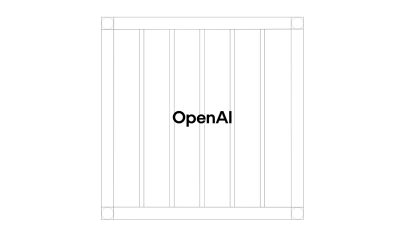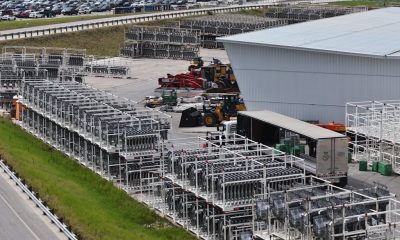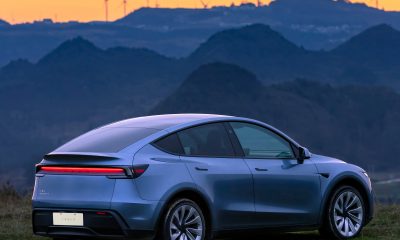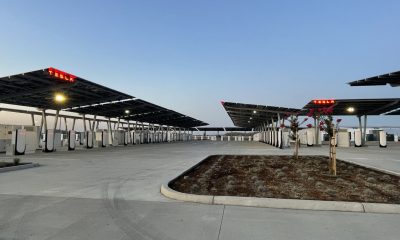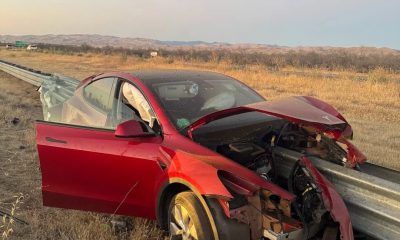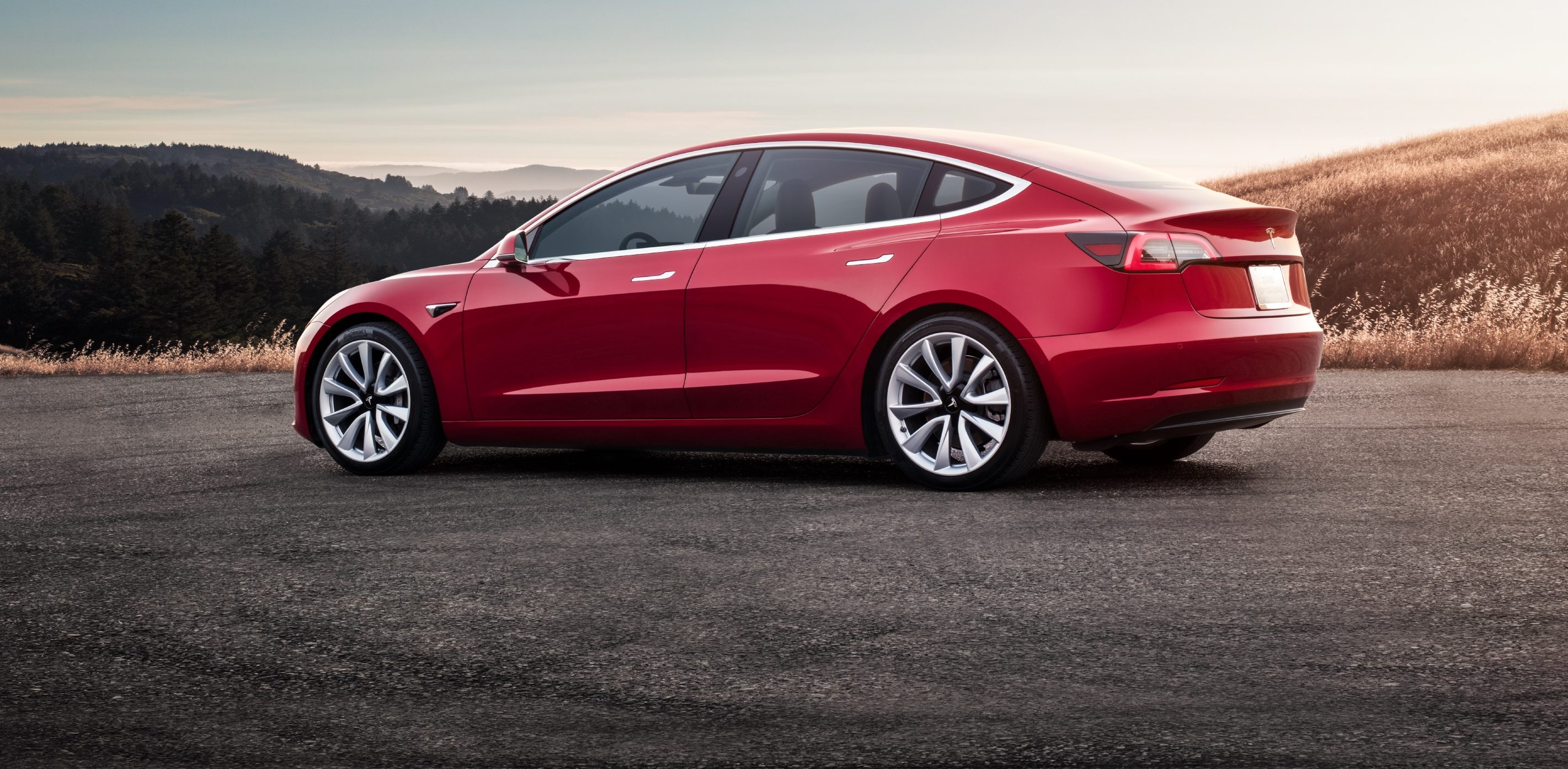

News
Tesla Model 3 dubbed best electric car by noted auto reviewer in 3-way evaluation
Noted auto reviewer Matthew DeBord has a lot of experience driving Tesla’s electric cars, lauding the Model 3 Performance as his personal favorite among the company’s vehicles in a review last month. His conclusions were appreciated by Elon Musk, who shared the veteran reviewer’s article on Twitter. Recently, DeBord raised the stakes for the Model 3, comparing it against two other premium electric cars he has driven in the past — the Jaguar I-PACE and Tesla’s own Model X — to see which EV is the best in the market today.
For purposes of his recent review, DeBord opted to use the Model 3’s Long Range RWD version, which cost $57,500 when it was acquired last year. The electric sedan was compared against the Jaguar I-PACE EV400 HSE, which costs a total of $86,720 with options and fees. The final vehicle in the triple threat evaluation — a fully-loaded Tesla Model X P100D — came at a premium price of $150,000.
In his analysis, DeBord noted that the Jaguar I-PACE is poised, powerful, and sleek, and it has a killer interior accented with premium materials such as brushed metal, carbon fiber, and wood. That said, the Jaguar does fall short in some areas such as its frunk, which is too small for any practical use. Its charging system, which relies on ChargePoint’s stations, also left much to be desired. Jaguar Land Rover’s InControl Touch Pr infotainment system is “too complex” and “not attractively designed” as well.
On the other hand, DeBord admits that the Tesla Model X P100D is a showstopper with its tech and features like its Falcon Wing Doors. Being the largest of the three vehicles, the Model X is a champion of storage with almost 90 cubic feet of available cargo space. Coupled with the Supercharger Network and its Ludicrous Mode, the Model X is an excellent vehicle. That said, the premium SUV also carries a very premium price.
Ultimately, DeBord opted to give the crown to the Tesla Model 3 as the best electric car among the three vehicles he evaluated. The Model 3 strikes a great balance for price and features, with its 0-60 mph time of 5.1 seconds and its access to the Supercharger Network. The auto reviewer also lauds the vehicle for its intuitive touchscreen and steering wheel trackball-based controls, which “provides a serene driving experience” after a small learning curve. Reiterating his observations in his initial review of the electric sedan, DeBord noted that there is simply nothing better among electric cars available in the market today, especially considering its price.
“There is no better vehicle of this type at this price that I believe I could currently buy. What’s really so hypnotically and addictively compelling about the Model 3 is how many great ideas have been crammed into one automobile. This is a car that’s absolutely bursting with thought, about the present and the future — and the distant future. Those ideas are overwhelmingly optimistic.”
What’s impressive is that the Tesla Model 3 which DeBord based his recent conclusion from is a rather early version of the electric sedan. Since the initial production of the electric car, Tesla has achieved a notable reduction on Model 3 costs, as evidenced by the $49,900 starting price of the Dual Motor AWD Model 3 today. Other improvements have also been rolled out by Tesla since DeBord’s initial review of the vehicle, such as Navigate on Autopilot.
Matthew DeBord is not alone in his conclusions with regards to the Model 3. Auto veteran and longtime gearhead Henry Payne of The Detroit News, for one, even dubbed the Tesla Model 3 as the publication’s 2018 Car of the Year. The vehicle has also been a commercial success for Tesla, selling more than 145,000 units over 2018, allowing it to become the year’s best-selling luxury car.
News
These Tesla, X, and xAI engineers were just poached by OpenAI
The news is the latest in an ongoing feud between Elon Musk and the Sam Altman-run firm OpenAI.

OpenAI, the xAI competitor for which Elon Musk previously served as a boardmember and helped to co-found, has reportedly poached high-level engineers from Tesla, along with others from xAI, X, and still others.
On Tuesday, Wired reported that OpenAI hired four high-level engineers from Tesla, xAI, and X, as seen in an internal Slack message sent by co-founder Greg Brockman. The engineers include Tesla Vice President of Software Engineering David Lau, X and xAI’s head of infrastructure engineering Uday Ruddarraju, and fellow xAI infrastructure engineer Mike Dalton. The hiring spree also included Angela Fan, an AI researcher from Meta.
“We’re excited to welcome these new members to our scaling team,” said Hannah Wong, an OpenAI spokesperson. “Our approach is to continue building and bringing together world-class infrastructure, research, and product teams to accelerate our mission and deliver the benefits of AI to hundreds of millions of people.”
Lau has been in his position as Tesla’s VP of Software Engineering since 2017, after previously working for the company’s firmware, platforms, and system integration divisions.
“It has become incredibly clear to me that accelerating progress towards safe, well-aligned artificial general intelligence is the most rewarding mission I could imagine for the next chapter of my career,” Lau said in a statement to Wired.
🚨Optimistic projections point to xAI possibly attaining profitability by 2027, according to Bloomberg's sources.
If accurate, this would be quite a feat for xAI. OpenAI, its biggest rival, is still looking at 2029 as the year it could become cash flow positive.💰 https://t.co/pE5Z9daez8
— TESLARATI (@Teslarati) June 18, 2025
READ MORE ON OPENAI: Elon Musk’s OpenAI lawsuit clears hurdle as trial looms
At xAI, Ruddarraju and Dalton both played a large role in developing the Colossus supercomputer, which is comprised of over 200,000 GPUs. One of the major ongoing projects at OpenAI is the company’s Stargate program,
“Infrastructure is where research meets reality, and OpenAI has already demonstrated this successfully,” Ruddarraju told Wired in another statement. “Stargate, in particular, is an infrastructure moonshot that perfectly matches the ambitious, systems-level challenges I love taking on.”
Elon Musk is currently in the process of suing OpenAI for shifting toward a for-profit model, as well as for accepting an investment of billions of dollars from Microsoft. OpenAI retaliated with a counterlawsuit, in which it alleges that Musk is interfering with the company’s business and engaging in unfair competition practices.
Elon Musk confirms Grok 4 launch on July 9 with livestream event
News
SpaceX share sale expected to back $400 billion valuation
The new SpaceX valuation would represent yet another record-high as far as privately-held companies in the U.S. go.

A new report this week suggests that Elon Musk-led rocket company SpaceX is considering an insider share sale that would value the company at $400 billion.
SpaceX is set to launch a primary fundraising round and sell a small number of new shares to investors, according to the report from Bloomberg, which cited people familiar with the matter who asked to remain anonymous due to the information not yet being public. Additionally, the company would sell shares from employees and early investors in a follow-up round, while the primary round would determine the price for the secondary round.
The valuation would represent the largest in history from a privately-owned company in the U.S., surpassing SpaceX’s previous record of $350 billion after a share buyback in December. Rivaling company valuations include ByteDance, the parent company of TikTok, as well as OpenAI.
Bloomberg went on to say that a SpaceX representative didn’t respond to a request for comment at the time of publishing. The publication also notes that the details of such a deal could still change, especially depending on interest from the insider sellers and share buyers.
Axiom’s Ax-4 astronauts arriving to the ISS! https://t.co/WQtTODaYfj
— TESLARATI (@Teslarati) June 26, 2025
READ MORE ON SPACEX: SpaceX to decommission Dragon spacecraft in response to Pres. Trump war of words with Elon Musk
SpaceX’s valuation comes from a few different key factors, especially including the continued expansion of the company’s Starlink satellite internet company. According to the report, Starlink accounts for over half of the company’s yearly revenue. Meanwhile, the company produced its 10 millionth Starlink kit last month.
The company also continues to develop its Starship reusable rocket program, despite the company experiencing an explosion of the rocket on the test stand in Texas last month.
The company has also launched payloads for a number of companies and government contracts. In recent weeks, SpaceX launched Axiom’s Ax-4 mission, sending four astronauts to the International Space Station (ISS) for a 14-day stay to work on around 60 scientific experiments. The mission was launched using the SpaceX Falcon 9 rocket and a new Crew Dragon capsule, while the research is expected to span a range of fields including biology, material and physical sciences, and demonstrations of specialized technology.
News
Tesla Giga Texas continues to pile up with Cybercab castings
Tesla sure is gathering a lot of Cybercab components around the Giga Texas complex.

Tesla may be extremely tight-lipped about the new affordable models that it was expected to start producing in the first half of the year, but the company sure is gathering a lot of Cybercab castings around the Giga Texas complex. This is, at least, as per recent images taken of the facility.
Cybercab castings galore
As per longtime drone operator Joe Tegtmeyer, who has been chronicling the developments around the Giga Texas complex for several years now, the electric vehicle maker seems to be gathering hundreds of Cybercab castings around the factory.
Based on observations from industry watchers, the drone operator appears to have captured images of about 180 front and 180 rear Cybercab castings in his recent photos.
Considering the number of castings that were spotted around Giga Texas, it would appear that Tesla may indeed be preparing for the vehicle’s start of trial production sometime later this year. Interestingly enough, large numbers of Cybercab castings have been spotted around the Giga Texas complex in the past few months.
Cybercab production
The Cybercab is expected to be Tesla’s first vehicle that will adopt the company’s “unboxed” process. As per Tesla’s previous update letters, volume production of the Cybercab should start in 2026. So far, prototypes of the Cybercab have been spotted testing around Giga Texas, and expectations are high that the vehicle’s initial trial production should start this year.
With the start of Tesla’s dedicated Robotaxi service around Austin, it might only be a matter of time before the Cybercab starts being tested on public roads as well. When this happens, it would be very difficult to deny the fact that Tesla really does have a safe, working autonomous driving system, and it has the perfect vehicle for it, too.
-

 Elon Musk1 week ago
Elon Musk1 week agoTesla investors will be shocked by Jim Cramer’s latest assessment
-

 News2 weeks ago
News2 weeks agoTesla Robotaxi’s biggest challenge seems to be this one thing
-

 Elon Musk1 day ago
Elon Musk1 day agoElon Musk confirms Grok 4 launch on July 9 with livestream event
-

 News2 weeks ago
News2 weeks agoWatch the first true Tesla Robotaxi intervention by safety monitor
-

 News5 days ago
News5 days agoTesla Model 3 ranks as the safest new car in Europe for 2025, per Euro NCAP tests
-

 Elon Musk2 weeks ago
Elon Musk2 weeks agoA Tesla just delivered itself to a customer autonomously, Elon Musk confirms
-

 Elon Musk2 weeks ago
Elon Musk2 weeks agoxAI welcomes Memphis pollution results, environmental groups push back
-

 Elon Musk2 weeks ago
Elon Musk2 weeks agoElon Musk confirms Tesla Optimus V3 already uses Grok voice AI


